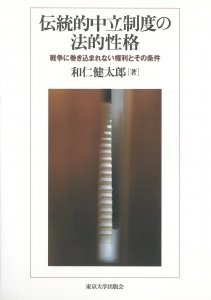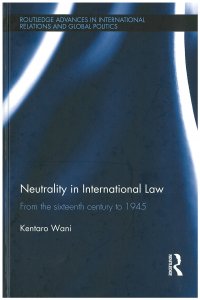Field of Research
International Law
Research Topics
The Law of Armed Conflict, the Use of Force in International Law, the Law of the Sea, the History of International Law etc.
Overview of Research
Before World War I, there was a field of international law called “wartime international law,” which roughly corresponds to the fields we now call “law of armed conflict” and “international humanitarian law”. Wartime international law comprises the “law of war,” which applies between belligerent States and the “law of neutrality,” which applies between neutral States (States not participating in war) and belligerent States. In war, belligerent States deprive people of life, freedom, and property (i.e., by killing or detaining enemy combatants, or attacking military objectives), and wartime international law attempted to rationalize such conduct and render it as humane as possible. Importantly, international law at that time recognized the freedom of States to resort to war as a means of solving international disputes or as an instrument of national policy. It could be said that wartime international law, which regulated how warfare should be conducted, was able to exist because international law prior to WWI did not regulate at all when a State may resort to war.
After World War I, however, international law went on to gradually restrain the freedom of States to resort to war (the 1919 Covenant of the League of Nations and the 1928 Pact of Paris), and now resort to war or the use of force against another State is in principle prohibited (except the exercise of the right to self-defense). That being so, a difficult question arises: why and how wartime international law, which regulated how warfare should be conducted, can continue to be valid under the current international law, which prohibits war itself? On this point, if we denied the applicability of such rules as those concerning the humane treatment of prisoners of war or those prohibiting the use of weapons which cause unnecessary suffering, war or armed conflict would become cruel and inhumane; therefore, the applicability of these rules, which are humanitarian in character, has been affirmed on the basis of practical and humanitarian considerations regardless of whether war itself is legal or illegal. In contrast, among the various fields that had previously been referred to as wartime international law, there are some for which there is almost no room for such practical and humanitarian considerations to operate. The law of neutrality and prize law are typical examples, and opinion is divided as to whether these laws are still valid in the current international law.
My main research interest lies in the issue of continued legal validity of rules of the law of armed conflict, especially those which are not humanitarian in character (such as the law of neutrality, prize law, the law of belligerent occupation), under the current international law. My research interest also includes the law of the sea, the history of international law, the use of force in international law, the application of international human rights law in time of armed conflict, war compensation.


WANI, Kentaro
Professor
Degree: Ph.D. (The University of Tokyo)
wani@osipp.osaka-u.ac.jp






























